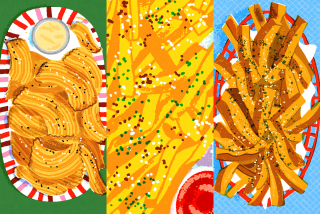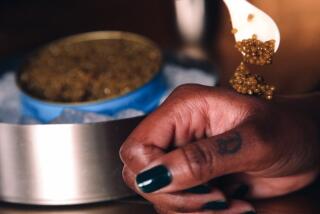France’s popular holiday pate even goes down market
- Share via
Reporting from Paris — Christmas is coming, and the goose is getting fat; or, more precisely, its liver is piling on the pounds.
France’s festivities would not be complete without the traditional Christmas Eve supper of champagne, oysters and a large slab of pate de foie gras, the emblem of Gallic gastronomy and the bane of animal welfare activists.
The French may be tightening their belts when it comes to buying presents, with some shopkeepers bemoaning sluggish sales. But their taste for the traditional and once rare delicacy is undiminished.
In a sign both of foie gras’ universal popularity here and of the more egalitarian times, a fast-food chain is offering the treat in a burger and supermarkets are stocking halal liver pate for their Muslim customers.
This time of year is as good news for French poultry growers as Thanksgiving is for American turkey farmers. About 37 million ducks and 700,000 geese will have been slaughtered over the last 12 months to feed France’s appetite for foie gras, which literally translates as fatty liver — but not before the birds have been stuffed with corn almost to bursting.
The pate is made by force-feeding ducks and geese, a method said by historians to date back to 2500 BC. It is unlikely, though, that the ancient Egyptians took to fattening their fowl on the industrial scale found in France, where foie gras and its controversial production method are enshrined in law as part of the country’s so-called cultural exception.
Article L654 of the 2006 Rural Code states: “Foie gras is part of the protected cultural and gastronomic heritage of France. By ‘foie gras’ is meant the liver of a duck or a goose specifically fattened by force-feeding.”
France produces about 75% of the world’s foie gras; other sources include the United States and China.
To produce the pate, farmworkers must first plump up the male bird’s liver. This is done by grabbing the fowl by the neck and pushing a pipe down its throat at least two or three times a day for about two weeks. The pipe pumps up to four pounds of grain daily directly into the animal’s stomach, causing the liver to bloat to as much as 10 times its normal size over the fortnight of gavage, as the procedure is called.
Neither the process nor the product is to the taste of animal campaigners, who consider the animals’ treatment cruel and inhumane.
“It’s a catastrophe for millions of ducks and geese, but we are fighting against a multimillion-euro industry that argues it is tradition. It has no other argument than that, which is nationalist and plain stupid,” said Brigitte Gothiere of the group Stop Gavage.
“I find it astonishing that in the name of tradition they can persuade people to eat the liver of a sick animal. It means if you have a clever enough marketing strategy and money you can persuade people to eat anything.”
A 1998 European Commission directive stipulates that animals must not be caused “any unnecessary pain, suffering or injury.” An 89-page scientific study adopted by the commission the same year found that death rates among the birds increased by a factor of 10 to 20 during the force-feeding period. The report described foie gras as the “pathological liver of a bird suffering from hepatic steatosis” — a buildup of fat cells that, in humans, would usually be caused by alcohol abuse or obesity.
In 2004, California passed a law banning the sale and production of foie gras in the state beginning in 2012. Force-feeding has been banned in Britain, Germany, Finland, Italy, Sweden, South Africa, Israel and several other countries.
French foie gras producers are unrepentant, arguing that force-feeding is not cruel. France’s association of foie gras producers, CIFOG, whose members in 2009 made more than 20,700 tons of foie gras, says Christmas sales of the delicacy are likely to be up compared with last year.
After the Belgian restaurant chain Quick introduced a burger with a slice of foie gras in France last month, former movie star Brigitte Bardot issued a statement saying: “Quick isn’t offering gastronomy but cut-price barbarity.”
Willsher is a special correspondent.
More to Read
Sign up for Essential California
The most important California stories and recommendations in your inbox every morning.
You may occasionally receive promotional content from the Los Angeles Times.













